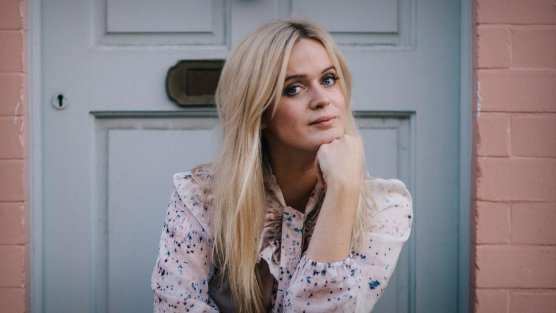
Leopard-print and midi dresses were the order of the evening as approximately 995 women and five men settled into their seats at the National Concert Hall last night to listen to Dolly Alderton’s words of wisdom on friendship, love and dating. Author of Everything I Know About Love, the Sunday Times columnist and co-host of The High Low podcast, Alderton graced the stage in a sparkling jumpsuit to the sound of David Bowie’s “Modern Love”, joined by her friend Lauren Bensted for a night of conversation, laughter and many glasses of white wine.
After professing her love for Taytos, Alderton kicked the night off by reading a chapter from her memoir, written exclusively for the newly released paperback edition, on the subject of turning 30. While Everything I Know About Love is an ode to the “shabby hopefulness” of her twenties, in this chapter, Alderton beautifully captures a conversation between herself and Bensted on what turning 30 really means. No longer able to partake in the “decade tourism” they revelled in at 29, the two women laughed uproariously at the aspects of adulthood that still baffle them – laundry and driving – with Bensted quipping that she had been a “lady of the bus” for the entirety of the previous decade.
Alderton nostalgically and unapologetically revisits the hedonism of her twenties in her memoir, looking back at her past self who desperately tried to “ignore the anxieties of reality” in favour of “pushing the boundaries in pursuit of flaneurism and bon viveur-ism – all the good French words!”. While she wrote of the trials of a twenty-something-year-old living with her best friends in London truthfully and from personal experience, Alderton admittedly couldn’t help but feel a “societal and cultural voice of shame seep in when writing those adventures”. She recognised that, while men can talk of their wild nights out and celebrate them openly, women are inherently made to feel like their adventures are too wild, too loud, and, when told, told too honestly. Yet Alderton disregarded this long-standing dichotomy between the way men and women tell stories, instead choosing to recognise the value of honesty and integrity above portraying herself as society’s view of the ideal woman.
Continuing the openness that the evening started with, Bensted raised the question of Alderton’s love life, which forms the subject of her first column at the Sunday Times. After a self-imposed, 18-month “sabbatical”, Alderton is now “back on the apps”. A self-confessed “pioneer of Tinder”, she candidly discussed the merits and the flaws of online dating, claiming that, in the post-MeToo era, her biggest bugbear is the use of Edwardian English. According to both Alderton and Bensted, men are now desperately trying to “prove that they are chivalrous”, wanting you to imagine them, not at a keyboard, but “writing with a quill, wearing a frock coat”. While receiving a message that reads “How’s it going, m’lady” is not exactly what Alderton wants from a potential boyfriend, she believes that online dating is one of the best ways of meeting someone. To prove her point, Alderton asked for a show of hands, asking if you knew of someone in a happy relationship that originated online, with the vast majority of a room of a thousand people raising their hands in agreement.
Forming relationships online is something Alderton is a dab hand at, having cemented her friendship with Bensted on MSN in the early 2000s. Changing into outfits that represented their 2005 selves, Bensted in an “I Luv John Mayer” t-shirt and Alderton in a wig that looked exactly like Brian May’s hair, they performed a conversation they had as teenagers that confirmed the long-lasting and utterly hilarious nature of their friendship. The “greatest love story” of Alderton’s memoir is not with men, but with her close group of female friends, the women that she grew up with and who were there for her always. An intimacy that struggles to be found elsewhere, Alderton deeply values platonic friendship. A memoir written by an author that is so utterly “taken and in love with every one” of her friends couldn’t but triumph the bond between women. While romantic relationships come and go, Alderton has faith in steadfast friendship above all else.
Leaving the stage smiling and arm in arm with Bensted, the atmosphere in the room changed. No longer a room of strangers putting on their coats and heading out into the night, each audience member left with the warmth of knowing they had a new friend and kindred spirit in Alderton, a friendship that would be valued and appreciated each and every time they opened her book.






